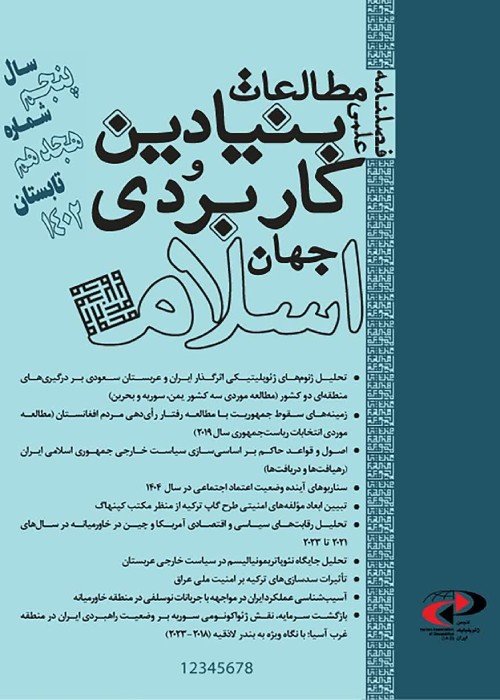The role of trans-Regional powers in the Geopolitical crises of the Islamic world
The Islamic world is one of the most sensitive and strategic areas in the geopolitical system at the spherical level. The enormous energy reserves, seas and communication routes, as well as its vast population and large population, have made this region a focal point in political and geopolitical equations. There are many opportunities in the Islamic world so that convergence in the Islamic world has the potential to bring about fundamental changes in the structure of global power. Despite the extensive human and natural capacities of geopolitical crises in the Muslim world, it has had devastating effects on sustainable development and sustainable security in the region, with geopolitical crises being a major obstacle to convergence between countries in the Muslim world. These crises have led to the boom in the economic capacities of the countries of the Islamic world, as well as countries engaged in security and marginalization issues and political conflicts. This descriptive-analytic study, using library resources and reputable internet sites, seeks to elucidate the role of trans-regional powers in the geopolitical crises of the Islamic world. This study highlights the role of transnational powers in the geopolitical crises of the Muslim world by identifying the sources of libraries and categorizing them in order to facilitate the identification of the role of these powers and their goals in the context of Islamic convergence. The Islamic world is one of the most dangerous areas in the world. The political security tensions in the region have had profound effects on the structure of power worldwide. The Islamic world has a variety of crises. Initially, the region, having been the center of the emergence of the world's religions, therefore has wide cultural complexities. Ethnic religious diversity in the region has made tensions visible at the formal, national and regional levels. Ethnic and religious differences have endangered the existence of political structures in the Muslim world. Ethnic geographical dimensions of the area is home to diverse ethnicities and races. The cultural diversity of these tribes has led the region to cultural competitions, with each ethnicity stepping in to develop its own culture. In the religious dimension, the territory of the Islamic world is divided between Shieh and Sunni religious groups. Another structural crisis in the Muslim world is problems with shared water basins and common border rivers as well as the dust phenomenon. As the Islamic World region is part of the arid region and the border rivers and catchments do not follow the political boundaries, so the shared waters pave the way for water conflicts and problems that have the potential for hydrophilic The title of a geopolitical crisis exacerbates the challenges of the Islamic world. Today, the problems of dehydration and dust have become a political security problem among the countries of the Islamic world, and these crises can be activated at any moment. Another geopolitical crisis in the Islamic world is geo-economics issues. Competition for sale of oil among oil-rich Islamic countries has hampered economic cooperation. Global powers are using the crises and tensions in sensitive areas of the world, including the Middle East and the Islamic world, to serve their own interests. Ethnic religious crises and in general the geocultural crisis, geo-economics crises and economic competition between regional powers and water crises in the Muslim world with regard to water problems have provided the ground for the presence and influence of world powers and these powers are exacerbated by the crisis being exploited. The resources of this region have prevented convergence. As it is seen today, with the increasing military and economic presence of world powers, the region is increasingly taking on new dimensions of spatial disruption and these crises are expanding. The results show that trans-regional powers have exacerbated geopolitical crises based on their goals, strategies and interests in the geo-economics, geocultural and hydraulic dimensions of the Islamic world. The economic wheel of world powers is turning to hydrocarbon energy sources, and these powers are increasingly in need of energy resources to meet their needs. Most of the world's energy resources exist in the Middle East in particular, and the Islamic world in general. Therefore, these powers are in the area of easy access to energy resources in the Islamic world. Global powers exacerbate geopolitical crises in the Islamic world by preventing regional cooperation between the countries of the Islamic world and securing their own interests and goals, thus making energy resources available at low prices and by turning the region into a market for the sale of their weapons. There is geo-economic competition in the Islamic world and between regional countries, and the interests of these powers are secured by preventing geo-economic cooperation between regional powers. On the other hand, the existence of geocultural crises in the Muslim world has provided the ground for the presence and influence of world powers to politically aggravate tensions in the region. As well as the hydrophilic problems in the Muslim world, it can pave the way for influence in the region's water projects to enable countries to engage in domestic issues and tensions at the local and regional levels, and to prevent cooperation and convergence between the countries of the Islamic world to achieve their goals. Follow their economy easily.
- حق عضویت دریافتی صرف حمایت از نشریات عضو و نگهداری، تکمیل و توسعه مگیران میشود.
- پرداخت حق اشتراک و دانلود مقالات اجازه بازنشر آن در سایر رسانههای چاپی و دیجیتال را به کاربر نمیدهد.


